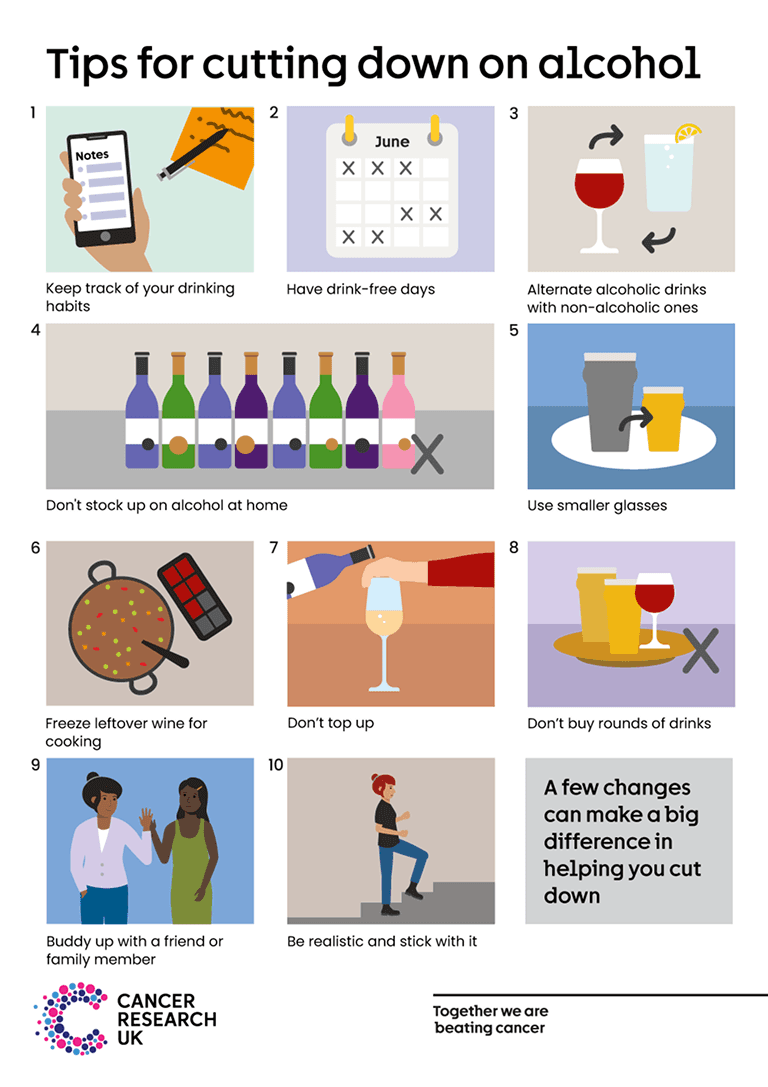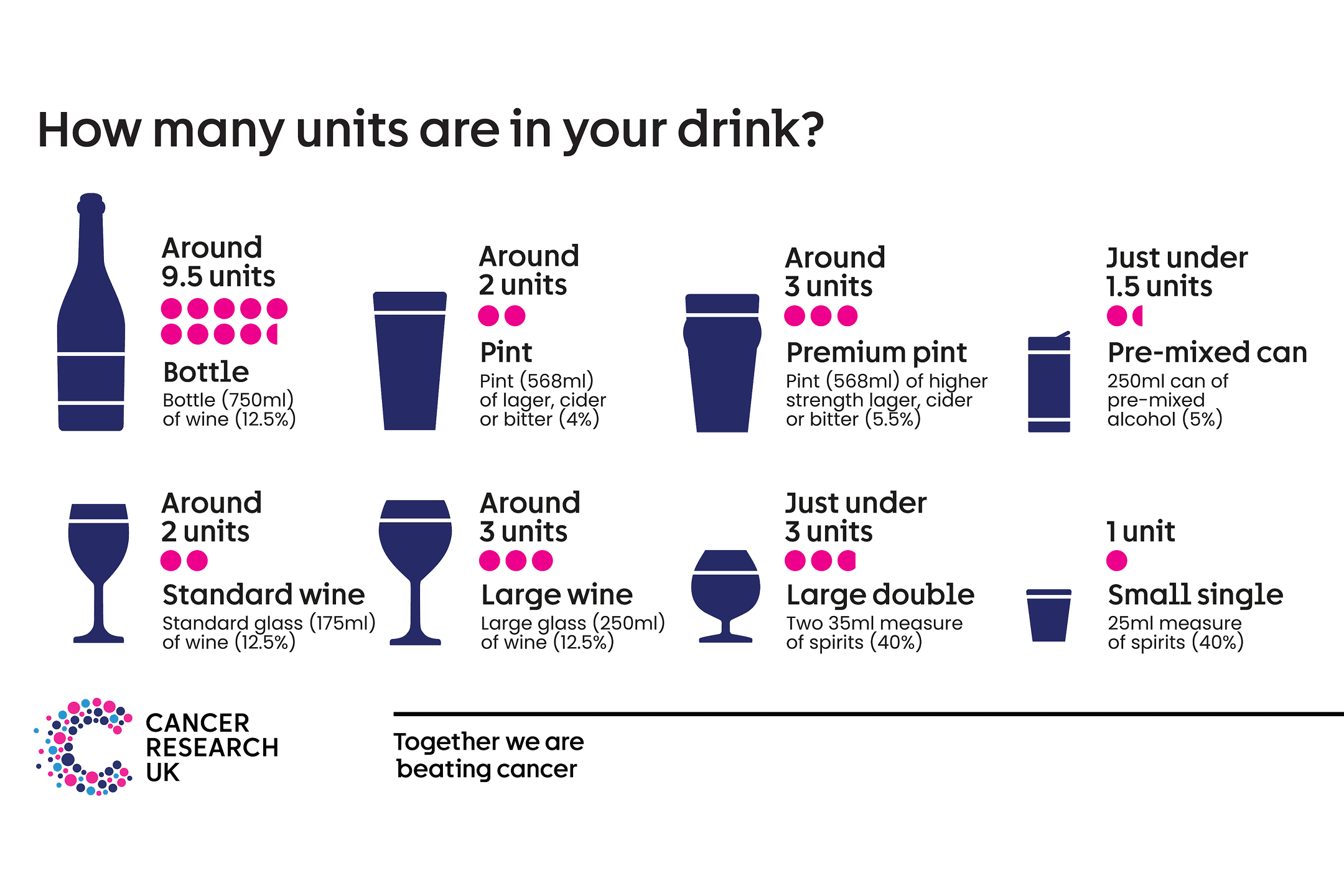Alcohol and cancer
Cutting down on alcohol has lots of health benefits, including reducing your risk of cancer. In the short term, drinking less alcohol can improve the quality of your sleep and help you feel better in the mornings. It can also reduce your risk of accidents, high blood pressure and liver disease.
Alcohol causes 7 different types of cancer. Even small amounts of alcohol can damage the cells of your body. So whatever your drinking habits, cutting down on alcohol is good for your health and will lower your risk of cancer.
Find out about the ways that alcohol can damage the body and cause cancer.

Set a goal for how much you want to cut down. You could keep a record of your progress and what you’re drinking using the free NHS Drink Free Days App, your phone, a calendar or a notebook.
Choose which days you won’t drink and stick to them. You could keep busy with a new hobby or being active on those days instead.
Stay hydrated and alternate alcoholic drinks with glasses of water. You could also try non-alcoholic versions of your usual drinks.
Storing alcohol at home may make it more likely that you’ll have a drink. Leave it out of the weekly shop and only buy alcohol on the day you plan to drink it.
Even if they have the same amount of alcohol in them, small glasses can help people drink less. If you’re on a night out, make your ‘usual’ a small.
If you are drinking wine at home, you don’t need to finish the bottle. Freeze the leftovers in an ice-cube tray to use in cooking.
Continually topping up your glass makes it hard to keep track of how much alcohol you’ve had. Instead wait until your glass is empty before having another.
If you’re drinking in a group, you don’t have to keep pace with everyone else. When everyone gets their own drinks, it gives you more control over how much you’re drinking.
Socialising doesn’t need to involve drinking alcohol. You could try going for a coffee, watching a movie or doing an activity with a friend or family member who also wants to drink less.
The sooner you build changes into your life, the better for your health. But it can be difficult to make lots of changes at once. Try making one change at a time. Small changes can add up to make a big difference.
Guidelines on alcohol recommend:
Drinking no more than 14 units of alcohol a week. This is the same for all adults.
Aiming for several drink-free days each week.
But there is no completely safe level of drinking, as alcohol damages your body even in small amounts. So the less you drink the better for your health.
Drinking a standard glass of wine (175ml) or a pint of beer every day would exceed 14 units of alcohol a week. You can find out about the units in your drink below, or using the free NHS Drinks Free Days app.

Units are a way to measure the amount of pure alcohol in a drink. Units are calculated based on the size of the drink (also known as a measure) and the strength of the alcohol (also known as the alcohol percentage).
Learning about units can help you to keep track of how much alcohol you are drinking.
For example:
One small single measure (25ml) of spirits (40%) has 1 unit of alcohol
A pint of lager, cider or bitter (4%) has around 2 units of alcohol
A large glass (250ml) of wine (12.5%) has around 3 units of alcohol
A bottle (750ml) of wine (12.5%) has around 9.5 units of alcohol
Visit Alcohol Change UK's website, for an easy-to-use unit calculator.
If you drink alcohol, it’s a part of your diet. Consider how cutting down on alcohol can help you have a more healthy, balanced diet.
Alcoholic drinks contain more calories than we might realise.
A large glass of red wine contains around 190 calories
A pint of bitter beer (less than 4% strength) contains around 170 calories
A large double serving (70ml) of spirits (40%) without a mixer contains around 155 calories
For comparison, a 330ml can of original coca cola contains 139 calories and a 25g bag of crisps is around 130 calories.
The calories in alcohol can quickly add up on top of the calories in what we eat; and any extra calories that the body can’t use are stored as body fat. Cutting down on alcohol could help you keep a healthy weight.
Find out more about how to keep a healthy weight and what makes a healthy diet.
Last reviewed: 01 Sept 2023
Next review due: 01 Sept 2026
Questions about cancer? Call freephone 0808 800 40 40 from 9 to 5 - Monday to Friday. Alternatively, you can email us.